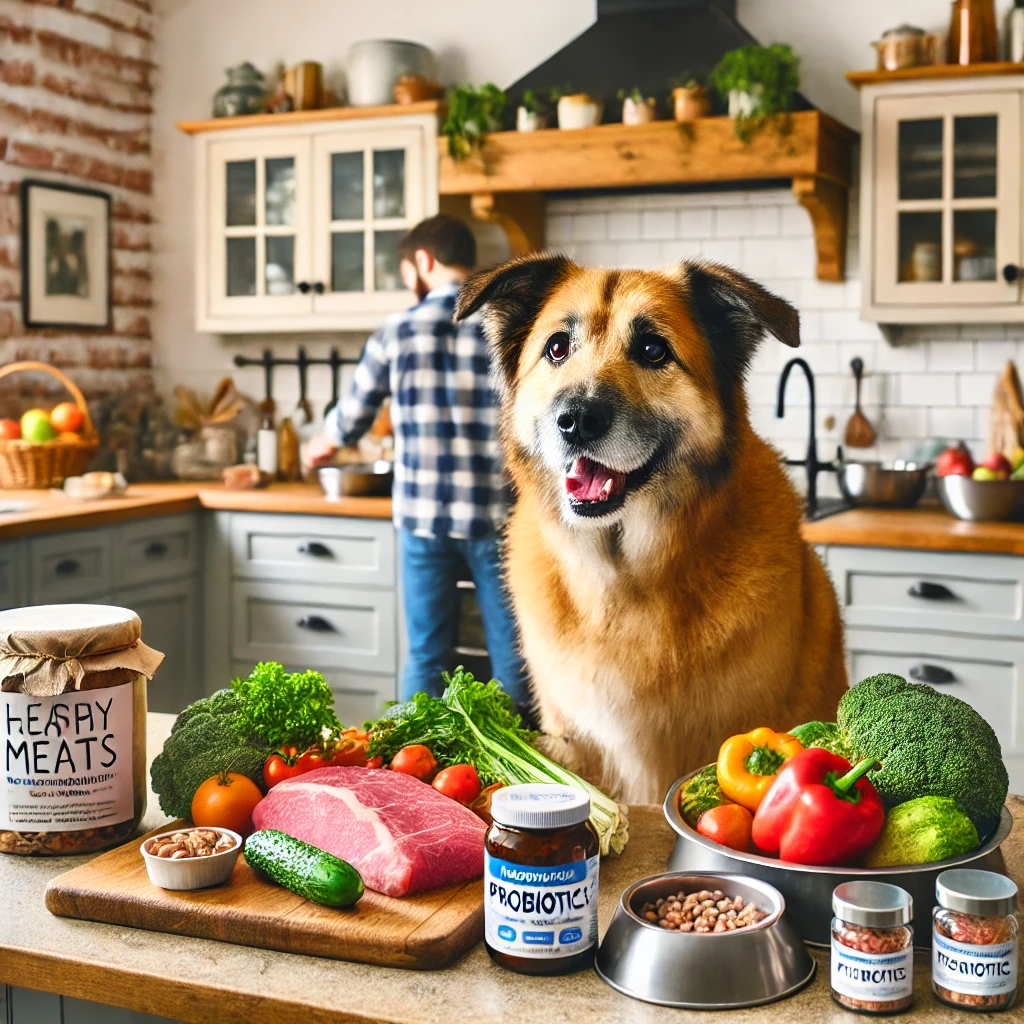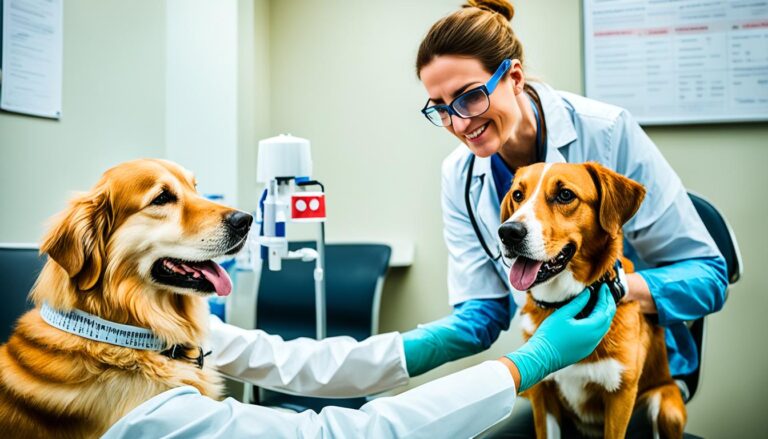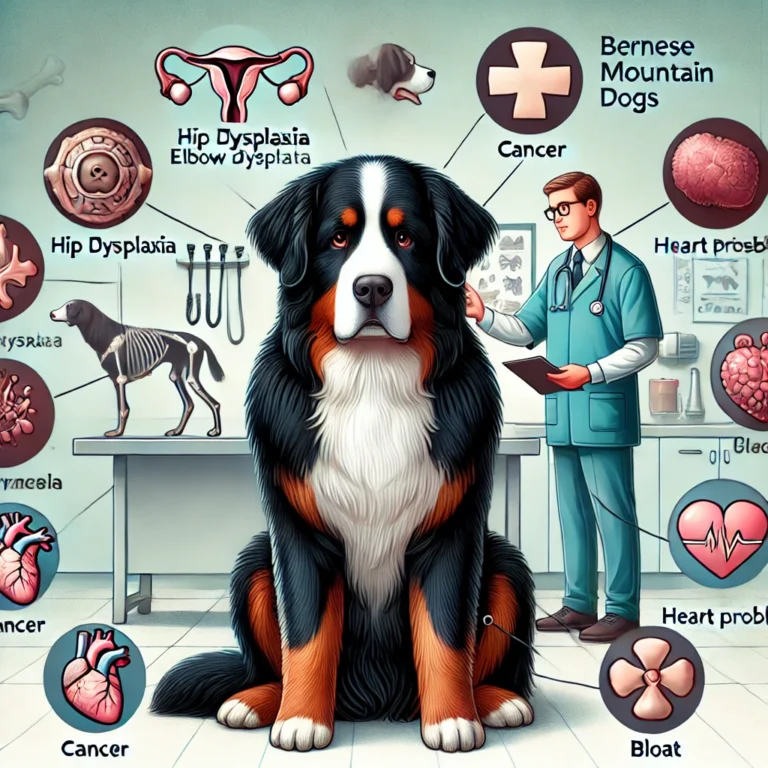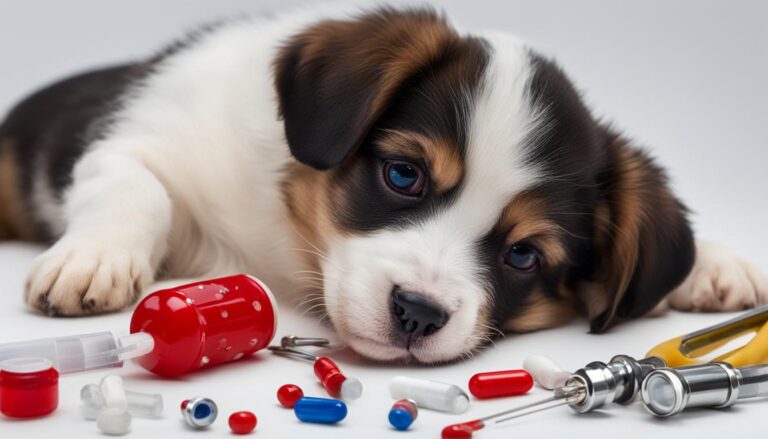Improving Dog Gut Health: Tips for a Happy Tummy
A healthy gut is super important for your dog’s overall health. It helps with digestion, getting nutrients, and keeping their immune system strong. By following some easy tips, you can keep your dog’s tummy happy and healthy. Let’s look at some key tips to help your furry friend feel their best.
Understanding Your Dog’s Digestive System
Your dog’s digestive system is more than just a place where food gets broken down. It’s a complex network that affects everything from their weight to their mood. Hundreds of microorganisms live inside your dog’s digestive tract, forming what’s known as the gut microbiome. This microbiome plays a crucial role in digestion, nutrient absorption, and even mental health.
Choosing the Right Diet for Gut Health
Importance of a Balanced Diet
A balanced diet is the primary way to manage your dog’s gut health. Good nutrition helps prevent common illnesses, boosts the immune system, and positively influences the gut microbiome. There are thousands of different kinds of bacteria in your dog’s gut, and each kind needs certain nutrients to survive. So, what your dog eats will influence which bacteria thrive in their gut.
Foods to Include and Avoid
To improve and maintain gut health for your dog, you need to feed your furry friend quality food. The best dog food for gut health is made using whole ingredients that include the full nutritional value of each ingredient. Think of it like this: If you only ate processed food, you’d start to feel sick—right? The same goes for your best friend. Focus on fiber and limit simple carbohydrates for pancreatitis.
Foods to Include:
- High-protein sources like chicken, beef, and fish
- Vegetables like carrots and spinach
- Fruits like blueberries and apples
Foods to Avoid:
- Highly processed foods
- Foods high in sugar
- Artificial additives and preservatives
Transitioning to a New Diet
Gradually transition your dog to a new diet to prevent gastrointestinal upset. Sudden changes can disrupt their gut microbiome and lead to digestive discomfort. Maintaining good gut health is vital for your dog’s overall well-being and quality of life. By following these essential tips, you can support a healthy digestive system and ensure your furry friend enjoys a happy, comfortable tummy. Remember, a balanced diet, regular exercise, and routine veterinary care are key to fostering optimal gut health.
Vet scientists from The Forever Dog have discovered that swapping out as little as 10% of your dog’s daily highly-processed food to something more gut-friendly will create positive changes in their body.
The Role of Prebiotics and Probiotics

Benefits of Prebiotics
Prebiotics are special types of dietary fiber that help the good bacteria in your dog’s gut grow. This can make your dog’s immune system stronger and even help reduce inflammation. Some high-prebiotic foods you can give your dog include apples, chicory, mushrooms, bananas, and flaxseed.
Benefits of Probiotics
Probiotics are the good bacteria that live in your dog’s gut. They help keep the bad bacteria in check, which can prevent gut problems. Adding probiotics to your dog’s diet can help maintain a healthy balance of gut bacteria, leading to a happier and healthier dog.
Sources of Prebiotics and Probiotics
You can find prebiotics in foods like apples, chicory, mushrooms, bananas, and flaxseed. Probiotics are often found in fermented foods like sauerkraut. You can also find pet-specific supplements that contain both prebiotics and probiotics to support your dog’s gut health.
Incorporating Natural Supplements
Herbs and Spices for Gut Health
Adding certain herbs and spices to your dog’s diet can work wonders for their digestive system. For instance, ginger is known for its anti-inflammatory properties and can help soothe an upset stomach. Turmeric is another great option, as it can reduce inflammation and support overall gut health. Just sprinkle a small amount over their food and watch the benefits unfold.
Fermented Foods for Dogs
Incorporating natural sources of probiotics into your dog’s diet can help maintain a healthy balance of gut bacteria. Fermented foods like yogurt, kefir, and sauerkraut are excellent choices. These foods are packed with beneficial bacteria that can improve digestion and boost the immune system. Start with small amounts to see how your dog reacts and gradually increase the serving size.
When to Consult Your Vet
While natural supplements can be incredibly beneficial, it’s always a good idea to consult your vet before making any significant changes to your dog’s diet. They can provide personalized advice and ensure that the supplements won’t interfere with any existing conditions or medications. If you notice any adverse reactions, stop the supplements immediately and seek veterinary advice.
Remember, every dog is unique, and what works for one might not work for another. Always monitor your dog’s health and adjust their diet as needed.
Lifestyle Changes for a Healthy Gut

Regular Exercise
Getting your dog moving is one of the best ways to keep their gut healthy. Regular exercise helps food move through the digestive system and keeps everything working smoothly. Plus, it can help reduce stress, which is another big factor in gut health. Try to get a few extra steps in each day with your furry friend.
Stress Management
Just like people, dogs can get stressed out, and it can mess with their gut. Make sure your dog has a calm and happy environment. Spend quality time with them, play games, and give them lots of love. A relaxed dog is a happy dog, and a happy dog has a healthy gut.
Routine Veterinary Check-ups
Regular check-ups with the vet are super important. Your vet can spot any potential issues early and give you advice on how to keep your dog’s gut in top shape. Don’t skip those appointments; they’re key to keeping your dog healthy and happy.
Maintaining good gut health is vital for your dog’s overall well-being and quality of life. By following these essential tips, you can support a healthy digestive system and ensure your furry friend enjoys a happy, comfortable tummy.
Remember, a balanced diet, regular exercise, and routine veterinary care are key to fostering optimal gut health for your dog.
Recognizing and Addressing Gut Health Issues
Symptoms of Poor Gut Health
When your dog’s gut isn’t in top shape, you’ll notice some telltale signs. Vomiting and diarrhea are common indicators. Skin issues, weight loss, and even chronic inflammation can also point to gut problems. Keep an eye out for these symptoms to catch any issues early.
Common Causes of Gut Problems
Several factors can mess with your dog’s gut health. Feeding an inappropriate diet and exposure to environmental toxins are big culprits. Sometimes, even stress can throw your dog’s gut out of balance. Knowing these causes can help you take preventive steps.
Treatment Options
If you suspect your dog has gut health issues, it’s time to act. Start by consulting your vet for a proper diagnosis. They might recommend dietary changes, probiotics, or other treatments. Remember, the sooner you address the problem, the better your dog will feel.
Keeping an eye on your dog’s gut health can make a world of difference in their overall well-being. Don’t wait until it’s too late to take action.
The Gut-Brain Connection in Dogs
Did you know that your dog’s gut and brain are closely linked? This connection, often called the gut-brain axis, means that what’s happening in your dog’s tummy can affect their mood and behavior. So, keeping their gut healthy can help keep them happy and calm.
Understanding the Gut-Brain Axis
The gut-brain axis is a two-way street. Signals from the gut can influence the brain, and vice versa. This means that a healthy gut can lead to a happier, more relaxed dog. On the flip side, an upset tummy can make your dog feel anxious or stressed.
Impact on Behavior and Mood
A healthy gut can do wonders for your dog’s mood. Dogs with a balanced gut microbiome often show less anxiety and more overall calmness. This is especially important for mental health dogs who need to stay calm and focused. If your dog is often hyper, improving their gut health might help in calming a hyper dog.
Ways to Support the Gut-Brain Connection
There are several ways to support your dog’s gut-brain connection:
- Probiotics and Prebiotics: These can help balance the gut microbiome.
- Balanced Diet: Feeding your dog a diet rich in nutrients can improve gut health.
- Positive Reinforcement Dog Training: This can reduce stress and improve overall well-being.
By focusing on your dog’s gut health, you’re not just helping their tummy—you’re also boosting their mood and behavior. So, if you’re wondering how to improve dog gut health, start with their diet and consider adding probiotics.
Remember, a happy gut means a happy dog!
Conclusion
Taking care of your dog’s gut health is super important for their overall happiness and well-being. By feeding them a balanced diet, making sure they get regular exercise, and keeping up with vet visits, you can help your furry friend feel their best. Remember, a happy tummy means a happy dog, and who doesn’t want that? So, keep these tips in mind and give your pup the love and care they deserve. Here’s to wagging tails and joyful barks!
Key Takeaways
- A balanced diet is essential for your dog’s gut health.
- Regular exercise helps keep your dog’s digestive system working well.
- Prebiotics and probiotics are great for boosting gut health.
- Natural supplements like herbs and fermented foods can help improve digestion.
- Routine vet check-ups are important to catch and treat any gut issues early.
Why is a healthy gut important for my dog?
A healthy gut helps with digestion, nutrient absorption, and a strong immune system. It keeps your dog happy and healthy.
What are signs of good gut health in dogs?
Signs of good gut health include regular bowel movements, a shiny coat, healthy skin, and good energy levels.
What foods should I avoid to maintain my dog’s gut health?
Avoid foods that are high in fat, sugar, and artificial additives. Always check with your vet before making any major changes to your dog’s diet.
How can I introduce a new diet to my dog without upsetting their stomach?
Gradually mix the new food with the old food over a week or two. This helps your dog’s digestive system adjust to the new diet.
What are prebiotics and probiotics, and why are they important?
Prebiotics are fibers that feed good bacteria in the gut, while probiotics are live bacteria that help balance the gut flora. Both support a healthy digestive system.
When should I consult a vet about my dog’s gut health?
Consult your vet if your dog shows signs of digestive issues like diarrhea, vomiting, or loss of appetite. Regular check-ups are also important to catch any problems early.









One Comment